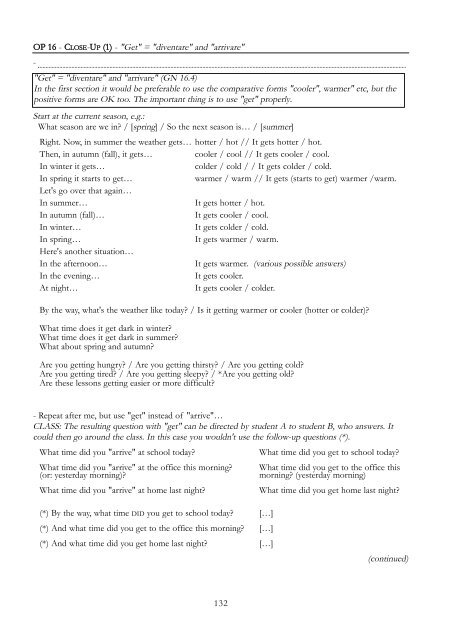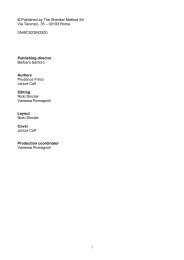O R A L P R A C T I C E Lessons 1 - 25 - Shenker
O R A L P R A C T I C E Lessons 1 - 25 - Shenker
O R A L P R A C T I C E Lessons 1 - 25 - Shenker
Create successful ePaper yourself
Turn your PDF publications into a flip-book with our unique Google optimized e-Paper software.
OP 16 - CLOSE-UP (1) - "Get" = "diventare" and "arrivare"<br />
-<br />
"Get" = "diventare" and "arrivare" (GN 16.4)<br />
In the first section it would be preferable to use the comparative forms "cooler", warmer" etc, but the<br />
positive forms are OK too. The important thing is to use "get" properly.<br />
Start at the current season, e.g.:<br />
What season are we in? / [spring] / So the next season is… / [summer]<br />
hotter / hot // It gets hotter / hot.<br />
cooler / cool // It gets cooler / cool.<br />
colder / cold / / It gets colder / cold.<br />
warmer / warm // It gets (starts to get) warmer /warm.<br />
Right. Now, in summer the weather gets…<br />
Then, in autumn (fall), it gets…<br />
In winter it gets…<br />
In spring it starts to get…<br />
Let's go over that again…<br />
In summer…<br />
In autumn (fall)…<br />
In winter…<br />
In spring…<br />
Here's another situation…<br />
In the afternoon…<br />
In the evening…<br />
At night…<br />
It gets hotter / hot.<br />
It gets cooler / cool.<br />
It gets colder / cold.<br />
It gets warmer / warm.<br />
It gets warmer. (various possible answers)<br />
It gets cooler.<br />
It gets cooler / colder.<br />
By the way, what's the weather like today? / Is it getting warmer or cooler (hotter or colder)?<br />
What time does it get dark in winter?<br />
What time does it get dark in summer?<br />
What about spring and autumn?<br />
Are you getting hungry? / Are you getting thirsty? / Are you getting cold?<br />
Are you getting tired? / Are you getting sleepy? / *Are you getting old?<br />
Are these lessons getting easier or more difficult?<br />
- Repeat after me, but use "get" instead of "arrive"…<br />
CLASS: The resulting question with "get" can be directed by student A to student B, who answers. It<br />
could then go around the class. In this case you wouldn't use the follow-up questions (*).<br />
What time did you "arrive" at school today?<br />
What time did you get to school today?<br />
What time did you "arrive" at the office this morning? What time did you get to the office this<br />
(or: yesterday morning)?<br />
morning? (yesterday morning)<br />
What time did you "arrive" at home last night?<br />
What time did you get home last night?<br />
(*) By the way, what time DID you get to school today?<br />
(*) And what time did you get to the office this morning?<br />
(*) And what time did you get home last night?<br />
132<br />
[…]<br />
[…]<br />
[…]<br />
(continued)



